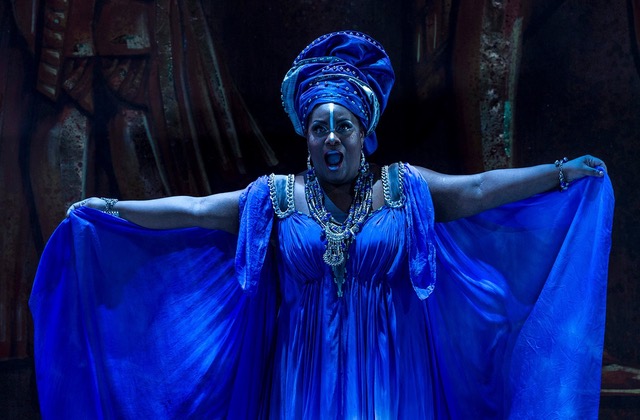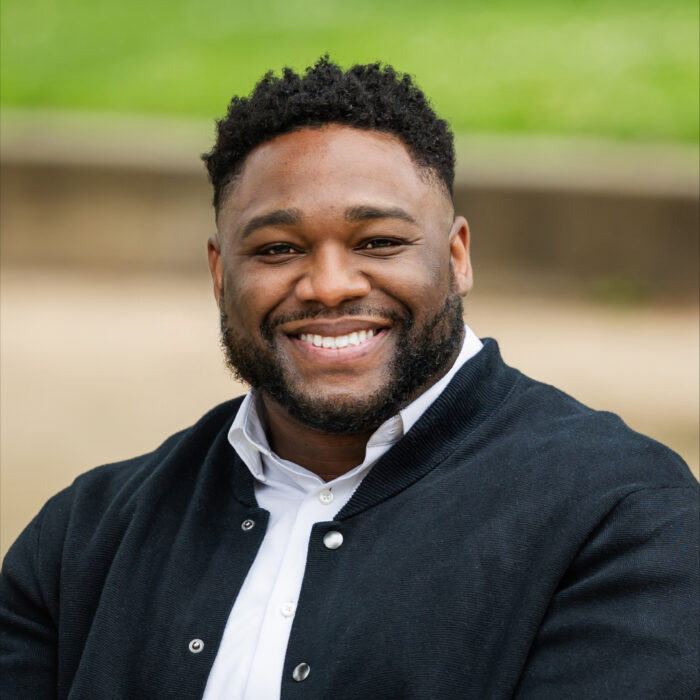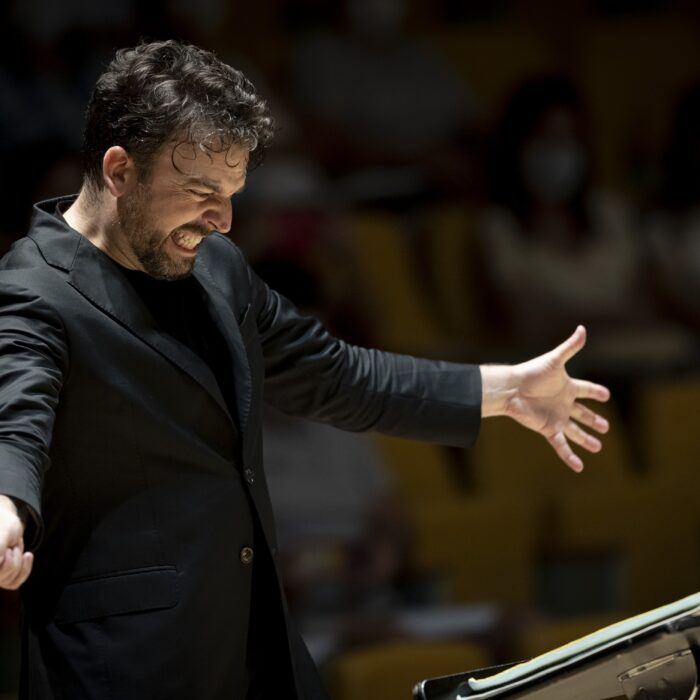Q & A: Latonia Moore on ‘Aida,’ Racial Equality in the Opera World, ‘Dead Man Walking’ & COVID-19
By Francisco SalazarThe moment Latonia Moore stepped onstage during the Opening Night performance of “Porgy and Bess,” launching the Metropolitan Opera’s 2019-20 season, the audience was mesmerized. The soprano stole the show with her potent rendition of “My man’s gone now.”
She received arguably the most applause of the evening and critics praised her for her “intensity.”
Moore made her Met debut in 2012 as a last-minute substitute in the title role in “Aida,” a role she has since performed over 100 times in some of the world’s greatest theaters including the Royal Opera House and Opera Australia. The soprano was scheduled to do four performances at the Met during the 2020-21 season. Due to the pandemic, those showcases were unfortunately canceled. Now the soprano is set to return to the famed New York opera house for her role debut in “Dead Man Walking” next spring.
With concerts postponed until 2021, Moore has become one of the most outspoken black artists on racial inequality. She has used her voice to continue the conversation for change in the arts industries and given her perspective on how the arts can be more inclusive.
OperaWire had a chance to speak with the soprano on the pandemic, racial inequality in the industry, “Aida,” and “Dead Man Walking.”
OperaWire: How have you been during this time of COVID?
Latonia Moore: When I first heard about it, it was before I left to do my last gig, which ended up being “Tosca” in Rouen. I was not thinking much of it because nobody in America was really making a big deal about it. But once I got to France, everyone was talking about it. The cast, the company. It was all over the news in February. And of course, by March, people were afraid of being in rooms together. During this madness, we were doing “Tosca” and everybody was asking why we were continuing with the performances if there is a deadly virus out there. So we were worried. But we did all of our shows and our last performance was on March 12. I flew back to America on March 13 before all the chaos ensued.
On my way back, I completely covered myself and took all the precautions with a mask and hand sanitizer. I got off the plane arriving at the Miami International Airport and went straight to customs and security and there was no problem. It was bizarre. No one took our temperatures or checked anything. At that point, I didn’t know what to believe and I had no idea what was going on. But then left and right I started seeing that at least 10 of my colleagues started falling ill and had contracted it and two of them died. So I wasn’t sure what to think about it and I definitely didn’t know what to think about going forward.
It’s been frustrating because I am not used to being home for big blocks of time like this. Usually, if I’m doing an engagement, I come home for six weeks and I leave for two months. The good thing about it is that I have been able to be here with my children. I have two children who are five and three and they are happy. My daughter told me not to go back and wants me to stay.
But not being able to sing is difficult. There is a part of me that is starting to lose it. And I know a lot of people feel the same.
OW: Before all the cancelations started to be announced, what were some of your next jobs?
LM: My next gig was a masterclass at the Manhattan School of Music at the beginning of April and I was also supposed to sing at the AVA Gala that was happening at the old Met in Philadelphia. The major engagement was to sing Serena in “Porgy and Bess” in Washington. I had been sitting in my home hoping that things would turn around and something would happen. But I was fully expecting that everything through the summer would be canceled, which it is. I was also supposed to return to France for more “Toscas” in Caen and I was also opening a huge outdoor theater in San Diego and singing at Disney Hall in Los Angeles. I understood that this was a way to keep the audience members and the people performing safely.
OW: Did any of your other engagements get rescheduled?
LM: I have a concert at the Mozarteum Hall in Sao Paulo, Brazil. That is postponed until December 1 and they were very hopeful about this. But the way things look in Brazil at the moment, I have to pray.
OW: What does your schedule look like now?
LM: I was originally set to cover Anna [Netrebko] and then I had four performances of “Aida.” Then I was covering Hibla Gerzmava and then I had Christmas concerts and Masterclasses, which are now canceled. January, I had nothing and we were going to start rehearsals of “Dead Man Walking” at the end of February. From there I had a number of concerts lined up. I am doing Musetta with the Philadelphia Orchestra and will be doing a piece called “Lilacs” with the Cleveland Orchestra. I’ll also be working with Yannick Nézet-Séguin on “Aida” in Canada.
OW: What was your reaction when the Metropolitan Opera announced it was canceling its “Aida” production?
LM: Up until the first week of June, the Met was planning on doing the old “Aida” instead of the new one and they were even looking at ways to do it outside. They spoke about reducing the orchestra and chorus. But I felt it couldn’t happen fast enough.
The Met usually runs everything during the summer and they knew they would not have the luxury of that this time. So there was no way it would be possible even if they found a vaccine. There would be no time to prepare everything. So when they announced the cancelation, I was devastated. I was really excited to do this production. But I guess things happen. People have to be safe. And I understand when my colleagues get upset when they see planes completely full. If they allow planes to be completely full, they should not say that theaters cannot be open because we’re super-spreaders and because of the virus. That cannot be a legitimate reason anymore. We should not be shipping thousands of people on a plane. We still haven’t figured out what we’re doing yet and so it makes things like opera near impossible to do. It’s a very frustrating moment. We want to sing and we will even sing through a barrier.
But there is still “Dead Man Walking,” which as of now is still scheduled. I think because this is a new American Opera for the house they won’t cancel it. It’s a new production and the nature of a production like it, you don’t need a lot on stage. It could be really simple and stark. It could be something that could send a big message. I believe it could happen and it is scheduled to open on April 8. I am hopeful that things will pick up.
OW: You were going to be part of this new “Aida” production. What were some of the new ideas that you were excited to explore?
LM: I was definitely excited to work with Michael Mayer and to work with Anna Netrebko.
There were some things I was thinking and one thing that always bothered me was that there was never enough emphasis on the relationship between Amneris and Aida. There is a lot to be built on and there is a reason why they have such an in-depth duet. I can’t wait to get back in there and think of some different ideas in their relationship. Maybe the way they were in the past and the things that actually happened in between when no one is singing and the way they communicate. I always felt there could be a lot more venom. A lot of people commented on the last time “Aida” was done at the Met and how Anna and Anita Rachvelishvili were blowing venom at each other. I think that both of them, the more they do it, they will take it further and further because they love to act and to be over the top.
Something else I hoped would happen this time would be a reading of the libretto. Last year I sang “Tosca” in Washington and before we did anything, we did a table read. we did it in English because everyone was American except for a few. But everyone spoke English. Table reads are so important because from there you establish relationships based on the natural energy from each individual person. I’m sitting and saying my lines and someone may respond a certain way and it changes the energy of the line entirely. I love building things between the lines to get there. That would have been something really important.
That kind of detail work is very important and we even did it in Rouen. We were speaking in Italian a lot more than we were singing. The director was a film director and he wanted it to be more of a conversation than singing beautiful long lines. This helps to find out how you will shape your lines and understand what you are saying in these stories. Our job is to tell the audience the story even if they don’t understand what we’re saying. The only way to do that is that way.
I have heard that this “Aida” will happen at some point so we will see.
OW: Aida was the role with which you made your Met debut and which you have sung at the house twice as well as around the world. What makes this role so special for you?
LM: When I first did Aida, I was thrown into it. I did my first Aida in 2009 and the way it happened was that someone canceled in Bergen in Northern Germany and they were doing this production outside in the water.
They needed someone to do it and my agent at the time, Matthew Laifer, told me, “This is it. You need to do Aida.” And I said, “I’m cool with Amelia in ‘Boccanegra’ and Mimì. I really don’t want to do that.”
And he told me that it was not going to get that much attention, “so if you can do it anywhere, you can do it here.” He said, “you’ve done ‘Ernani’ and ‘I Due Foscari’ and ‘Aida’ will not be as much of a stretch as you think.”
So I did the “Aida” and I felt so much pressure to sound more spinto. I felt like I was supposed to make something happen that I couldn’t achieve. So those first “Aida’s,” I felt were so lyric for me and I felt like I was Liù floating around as Aida. It didn’t have depth and I wasn’t sure it was actually for me.
Then I did an “Aida” in concert in Minnesota with Andrew Litton and there I tried to be more bombastic and beef it up. He told me to “calm down and just sing the way you sing” and “I will go with you.” So I said “okay” and that’s what I did. And the reason it was happening was that I was listening to recordings of Leyla Gencer and Renata Tebaldi and these girls have these powerful spintos. There is a part of my voice that has that and there is a part of my voice that doesn’t, which is my low voice.
My voice is not bombastic and it’s simply a lyric sound. I’ve never tried to make it something it’s not. My voice will never be Leyla Gencer no matter how much I want that. So I just need to do my own thing and I continued to do that and I did new productions in Hamburg. But it still didn’t fit and I had this fear of it sounding too heavy.
When I realized that I could be a good fit for “Aida” was at Covent Garden. I was second cast with Liudmyla Monastyrska. She is a gorgeous colleague and a great singer. She looked at me and said, “I think you have so much fear. You should not be afraid because you are Aida.”
And I said, ” I am so sick of people saying that.” I started to realize that I made myself fit into “Aida” because that was what they were giving me. But I was being given the role because I was black. And finally, it clicked and I realized that they were taking a voice that should be singing Mimì or Violetta without Act one and pushed it into Aida. I said “fine, I will sing Aida.” And when I sang those performances, it finally fit. This was me. Of course, I would never go into the tomb and kill myself. I would have gone home and ruled and become Queen Aida and taken revenge on people who killed my man. So I am very different from her. But fundamentally and inherently on the emotional level and the inner turmoil, we are similar. So when I let go of what the music is supposed to sound like and all the people who have sung it before or could sing better after, I felt like it fit.
There are other roles that fit me better as far as the voice goes and others that fit me better in terms of look. But I feel like there is something that was meant for me to do Aida. And when the Met finally gave me the opportunity to get up and to do it without any rehearsals, I finally made my mark.
And after that, I did it in so many places and it grew with me. I became invested in the way I looked, in the costumes, and makeup and I always had a say. We would always come up with different versions of the story and tell it differently. From production to production, I started to look for different ways to beef up the story and create a different back story to make the characters different. And I feel like my Aida is fully seasoned and it’s mine. I have fallen in love with it and I feel like I can make it different each time and make it special.
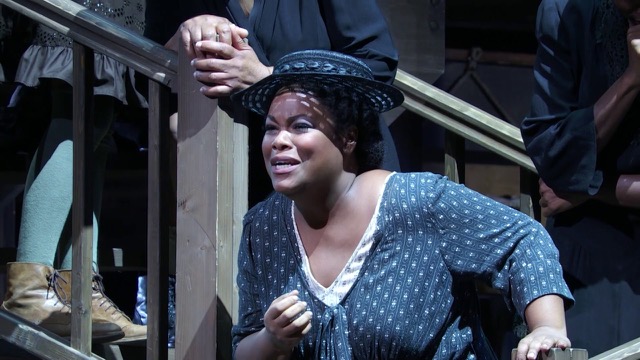
OW: You said that companies only cast you as Aida because you are black. Recently, there has been a discussion that it is inappropriate for white singers to perform the role. Do you feel that in opera we should adhere to rules like the ones that were outlined in the copyright of “Porgy and Bess?”
LM: I think it’s hard to argue with a copyright that’s so specific when it comes to “Porgy and Bess.” I will answer the question as if there was no copyright at all and if anyone in the world could perform “Porgy and Bess” no matter what they looked like.
I can’t deny that me being black as Aida offers a certain level of authenticity that we would not get if we saw someone who was glowing white. But it’s only because people have become so caught up in the colors of the story. They’re caught up in the fact that Aida is Ethiopian and that Radamès is Egyptian, which is a black African and white African. That is where the countries make the divide. And this is what everyone is hung up with.
However, the issue I have always had with that, is that this is opera. The whole reason why I got into opera and why many people got into it was because it doesn’t matter what you look like. The point of the art form is not for you to look exactly like the character you portray, the point is for you to bring the character to life through song. Of course, it’s about energy and the way you move and look. You do have to be a certain size and shape to be able to move properly. The fact is that you should be able to portray a character with your visuals and body and even with your color.
All of that being said, I believe that if an Aida feels comfortable coloring their skin and they want to blacken their skin to sing a role, that is their prerogative. And the reason why I have never taken offense to it is because that is what this art is. I got into this art to be chameleon and that is what I want to do.
When I was in Tokyo and I did “Aida,” they painted me black. When I was in Palm Beach and I did “Madama Butterfly,” they painted me white. When I was in Tokyo, I asked, “Why are you painting me black?”
And they said, “Because the dancers and the people playing Ethiopians are wearing dark bodysuits and they’re darker than your skin and we want you to match perfectly.”
And I said, “Just so you know, not all black people look the same or are the same shade.”
And they said, “In this case, we just want it to be uniform. ”
And I said, “It’s a stretch, but I’m down with it. Paint me.”
Now I could have been offended and said, “How dare you say I need to blend in with those dark bodysuits. What’s wrong with my skin?”
But I didn’t do that because this is an art and in art, you’re not supposed to take offense. I’ve always felt the same way about it and it’s controversial to feel this way because a lot of people don’t agree. I only get upset when someone means to offend me. And I don’t think that these women putting on this makeup are trying to offend anyone.
However, I do think that they are not considering what anyone thinks. If someone told me they were offended by me painting myself white for “Butterfly” or for “Ballo in Maschera” and they really took issue, I would apologize wholeheartedly and make an effort to be more sensitive. But me personally, I believe if you want to paint your skin for art, you should.
I also believe that if you have a director that has a vision like at the Arena di Verona, which has a history of painting its Aidas black and you don’t feel comfortable, don’t take the job. Your job is to realize the director’s vision, like any actor or actress. And it gets sticky because we are people and we have personal feelings.
But for me personally, I painted my skin lighter when I did Desdemona and I loved it. I put this silver over my skin so that when I walked out, I glowed and so that that was why Otello was so obsessed with me. It’s almost light “Twilight,” when they walk out the vampires are glowing. That’s why I did it.
If someone would have been offended, I think I would have taken it off. But I would have been hurt because I thought that was a hot expression. You can’t please everyone. The only thing you can do is be you and be honest and present yourself as you are. And I felt more like Desdemona by going out and being this glowing sparkling Angel then I would’ve if I would’ve gone out with dark skin that didn’t reflect the light in the same way in that specific production. And it’s not racist or anything like that. It’s an artistic decision.
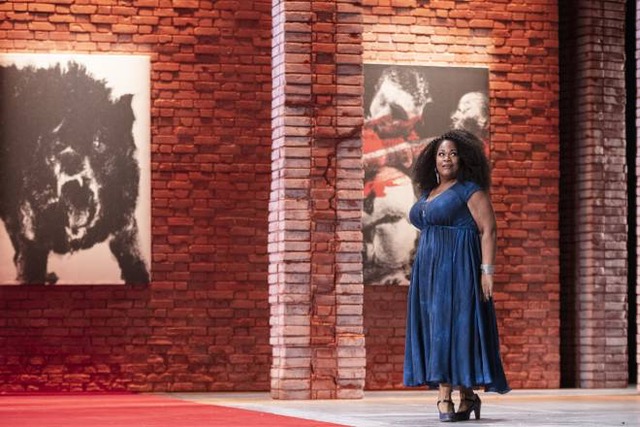
OW: Do you think culture and traditions play into the way people view something like “Aida?”
LM: Your upbringing and your conditioning within your country play a part regarding race. And in this case, specifically, black. In America, we’ve been through a lot. And the last thing that a lot of black Americans want to see is somebody up there in blackface when you could get another black singer to do it. I think that is what has become the issue rather than what it looks like.
It is what it represents and it makes us feel like we weren’t good enough to go up there and do it. However, Verdi didn’t write “Aida” with a contingent upon her having to be black to play it. But Gershwin did. He fully wrote with the intent that only black people could perform it. There is a part of me that thinks that there are so many people that are not black that want to do it and that have done it any way that they can get around the copyright.
OW: How do you feel about the Hungarian State Opera doing that all-white “Porgy and Bess” and then saying they were from black origins?
LM: I have always thought that it is pretty amazing when people of other cultures want to perform it. I don’t think it’s right for you to say that you want to identify as black so that you can actually do the opera.
But at the same time, how crazy that this company was willing to do something like that and to say something so controversial just to do “Porgy and Bess?” But I am not going to lie that I thought it was sick and I laughed. But I also thought, “What if we flip the script? What if there was a predominantly fully black community and they wanted to do a work that had a copyright and they said they were all Jewish so they could do the work?” That is how I also kind of looked at it. This score is incredible and its jazz. Everyone knows this score and its familiar. And that is around the world. So I understand, but there is a copyright.
OW: This upcoming season will mark your second HD in the company premiere of “Dead Man Walking.” What does it feel like to premiere work at this historic theater?
LM: It’s awesome and I’m ecstatic. I’m so lucky and this will be my debut. The only “Dead Man Walking” I know and the only Sister Rose I know is Karen Slack. She is the only reference I have and I know others have done it, but she was the only one I knew. I thought it was Karen, who would get the part and I was shocked when I got the offer. They said, “We think you would be great for this character and your the type of actress who could play well off of Joyce.”
Joyce and I went to the same school and I admire her so much and when she heard I was doing it, she freaked and was so excited. And I am excited because Sister Rose can be looked at as a supporting role but this character represents your conscience and she is the one reminding you of deep love. She is that pure person in the opera. Helen Prejean, as much as she is a nun, wants to do the right thing and she has that conflict, and Sister Rose is the one that irons it out for her. And the music is so amazing and Sister Rose is blessed with some gorgeous lines.
OW: You worked with Karen Slack during the “Porgy and Bess” at the Met. While doing that production, did you talk to her about the role of Sister Rose?
LM: I’ve known Karen for 20 years and she has come to so many of my shows. She showed up at the English National Opera “Aida” in London. She wanted to go and see it and she went to Cincinnati to see my “Aida” as well. This woman is so supportive and I really hope she ends up in an administrative position as well as her career as a singer. She has the right mind and attitude and people love to hear what she has to say. She has been so supportive.
And when we talked about “Dead Man Walking,” she agreed with me and feels the same way about Sister Rose. This character is strong and pure. We didn’t go in-depth but she did say, she was excited for me and that I was going to love it. She said the role has soaring and sweeping lines and had some Strauss-like music. But I love her and she is the type of person you want to see succeed and I hope she gets to do it at the Met.
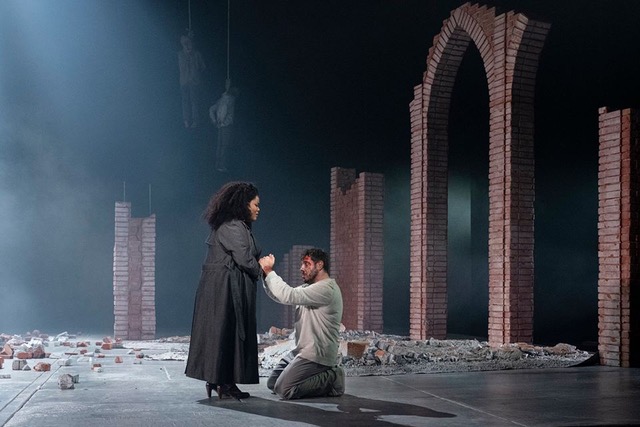
Credit: Arnaud Bertereau
OW: Throughout the past week, there have been a lot of conversations about change and dealing with race relations. Opera has been a big part of the conversation as well. What do you believe can be done for the industry to change so we can see more representation?
LM: When I was the cover in “Aida” and did my debut, I had already sung the role in some major houses. The original soprano canceled the final two performances and the first one she canceled, they flew out another singer because she was a star. I was upset because they didn’t want to put me on. But my colleagues were so supportive and I remember Stephanie Blythe, Aprile Mille, and Marcello Giordani spoke up and were behind me. They kept such good energy and the company changed its mind. I finally got to go on and made my debut.
There was another situation at the Met where the original soprano pulled out of “Madama Butterfly” because she didn’t have time to prepare. So they brought someone else and I did one performance. I saw the girl who was the cover and she was upset because they didn’t put her on. I was in that same situation only a few years before.
And I was told that the reason they don’t do it is that we aren’t stars. I get that stars sell tickets and a young soprano won’t sell tickets. It happens a lot in many companies. And I think one thing that I could hope for in the future is that it doesn’t always have to be the same people for every production. Stars are important but there are other singers.
Another thing is that when you decide to give your singer one or two performances, make sure to promote it. Companies have to realize that when that singer gets a following through your company, they will be able to sell the house. But there is no way of knowing it unless you actually promote it and giving backing to all of your artists. If we see more of that moving forward, change can happen.
I know the Met has made an effort to give their covers at least one performance but it’s promoting them that is important. And for opera companies, in general, we have to realize that everyone looks different and if we only see one type of person on the stage as a young person watching, we’ll think it’s not attainable. If we don’t see different people on the stage all the time, then there will be people that compartmentalize.
One thing that was amazing for me as a young person was to turn on “Sesame Street” and see Denyce Graves singing opera. Yes, I saw the album covers of Leontyne Price and Grace Bumbry but there was something about watching that that seemed tangible. There was something about that and if I didn’t see these women on stage, I would have never tried to do it. I would have always said it was for a certain type of person.
I do want to make something clear. I don’t want to see a woman hired because she is from a specific place or race but she is mediocre. I want to see that woman be hired because she is amazing. If she is amazing, give her the opportunity.
I also know that people attack the Met, but I know they have moved towards those changes. They are on their way and they are doing Terrence Blanchard’s “Fire Shut Up in My Bones.” That score is gorgeous and I know that the Met would have done it even if he was white. I know however that they are more likely to do it right now because there is a black movement and the Met wants to make an effort to show it to everyone who hasn’t been exposed to it. They want to show it to their audience members who only go and see “La Traviata” and “Aida.” They want to expose it to them. People might not like it but I think these American stories and these deep-rooted stories will be powerful to see. And regardless of the reason, they are doing it, they are going to do it and that is important.
And in many opera companies, it is happening and I really appreciate it.
